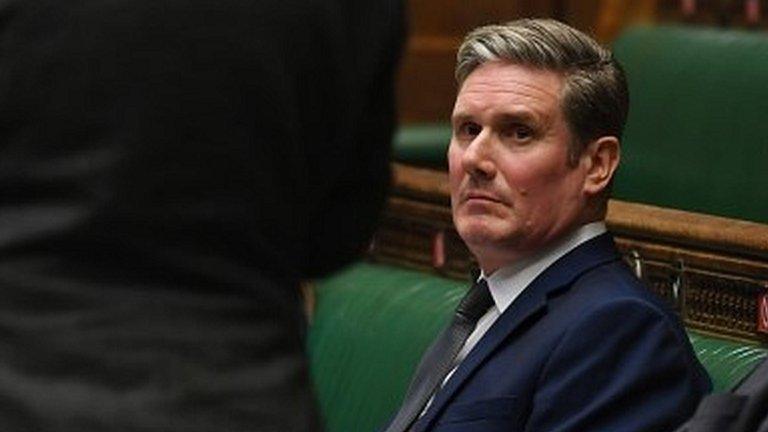How long can Starmer play the waiting game?
- Published

The office smells of new paint.
The leader of the opposition's lair in one of Parliament's more faded buildings still has the same vintage Labour posters on the walls, but the decorators have been to in to freshen up the place.
What Sir Keir Starmer is aiming for is more than a bit of smartening-up. Above all right now, five months into post, the Labour leader wants to draw a line under all the controversies of the Corbyn era, to draw the bitterness out of the party's quarrels and to shout as loudly as he can to the public that things have changed.
This means, in contrast to his oh-so-careful language during the leadership campaign, that he is being blunt - very blunt.
On Tuesday, he told the party and the public that Labour deserved to lose the last election.
On Wednesday, he told us that the party had "betrayed" voters by failing to win and "gifted the Tories a decade or more in power".
Drawing a line under the last five years in order to move on is achingly obviously his priority. Many on Labour's left are irritated by his now very public attitude to the past. But for some of Sir Keir's backers, they are annoying precisely the right people.
What is less clear is the kind of conclusions the Labour leader wants the public to draw about what he would actually do if he won power.
His attack on the government is on competence. His increasingly harsh criticism of the prime minister, of his character.
The job is huge to get Labour in the kind of state it needs to be in 2024, and it's understandable that right now he is reluctant to give more than vaguely pleasant sounding promises about his and the party's values. There are four years to the next general election after all.
There's a huge "but", however.
2021 will also see an enormous set of local elections, elections for mayors around the country and in London, elections in Wales and critically elections in Scotland.
Audible fudge
Sir Keir refused repeatedly to say whether he would back another independence referendum. The party is officially a unionist party, and will argue against the question being put to the people again.
But there is an audible fudge around whether the party would stand in the SNP's way if it wins next year. Despite his contention this is a "hypothetical" question, it is in fact likely to be the central question in the Holyrood elections next year.
Repeatedly refusing to answer the question "If not now, what about never?" allows, for now, the Tories to present themselves as the only definitive backers of the union - and the SNP as the only clear supporters of independence.
It is easy to see why Labour right now is reluctant to avoid being tied to definitive positions on anything. The country is living through a very uncertain moment.
Sir Keir has a huge job sorting out the party's woes, and trying to cut through to the public. But leaving blanks on Scotland, or on any other issue creates a risk for the party too.
Politics is not always willing to wait.
- Published1 July 2022

